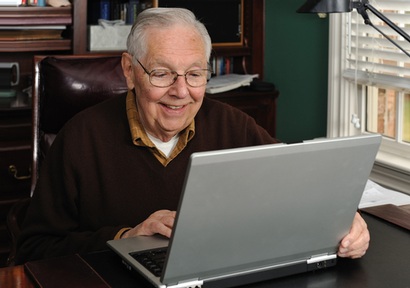Gracewell Healthcare backs carehome.co.uk's call for ICT in all care homes
Care provider, Gracewell Healthcare, has thrown its support behind a plea from carehome.co.uk, leading guide to care homes, for all care homes to give their residents internet access.

A survey by carehome.co.uk found that only a fifth of all care homes give their residents access to the internet - 3,400 out of the 20,000 care homes in the UK.
Davina Ludlow, director of carehome.co.uk, said: “We would like to see more care homes giving residents access to the internet. ICT should be an integral part of life in a care home.
“The internet can be crucial in giving older people and people living with disabilities back their independence and stop them feeling so isolated. They can shop online, order books and DVDs, chat to family and friends using Skype, and look at photos on Facebook.
“ICT can play a vital role in engaging people who are living with dementia. iPads can be used as memory reminiscence tools as music and archive photos from different eras can unlock memories and can easily be accessed by touching the screen.”
She added: ““ICT is also great for helping grandparents and their grandchildren to interact as using tablets such as iPads can make communicating so much easier.”
Peter Curtis, chief executive of Gracewell Healthcare, which has nine care homes, said: “I was disappointed to learn on carehome.co.uk that only a fifth of 20,000 care homes in the UK provides internet access to residents.
“The digital revolution has created an incredible opportunity for older people to be more connected and engaged with their friends, families and the wider community than ever before, and as a sector we must meet this need.
“At Gracewell Healthcare we understand that technology, as part of a tailored personalised care plan, has the power to combat feelings of isolation and loneliness and that’s why all our Wi-Fi enabled homes feature an internet café where residents can go online, surf the internet, email and Skype their loved ones.
“Some critics argue that it is often too challenging to teach older people how to use ICT devices, but in my experience this is simply not true.
“Firstly technology is getting easier to use and more intuitive all the time - this simplification has been the whole rationale behind Apple’s success. Secondly there is ample evidence that older people including those with dementia are fully capable of learning new skills – you only have to look at the success of dementia choirs up and down the country.
“Introducing technology offers an activity which carers and families can share with residents as they learn how to use a lap top or an iPad. For instance at Gracewell we like to encourage our residents to create their own digital life scrapbook (photos, videos, scans or precious letters) which is not only therapeutic but it leaves a wonderful legacy to the following generation.”
He added: “It’s time that we put care homes right across the UK online so we can ensure that the people we have the privilege to care for have the opportunity to stay connected no matter where they live.”
Baroness Sally Greengross, chief executive of The International Longevity Centre-UK think tank, is also supporting the plea for more care homes to provide internet access and called the findings of the research “disappointing”. She said: “I am glad that carehome.co.uk is calling for more care homes to give their residents access to ICT. This is an area that really needs to be address to ensure that care home residents are fully included in today’s society.
“These findings that only a fifth of care homes have internet access are very disappointing. Technology can stimulate creativity and trigger reminiscence. It is so important for the intellectual and emotional wellbeing of older people, enabling them to connect through friends and family by email, Facebook and Skype. I would urge all care homes to have ICT as an integral part of their homes as it is a vital part of residential care.”
Latest News
 29-Jul-24
Dementia Bus gives carehome.co.uk staff insight into life with dementia
29-Jul-24
Dementia Bus gives carehome.co.uk staff insight into life with dementia
 01-Mar-24
Find out the top care homes in 2024
01-Mar-24
Find out the top care homes in 2024
 21-Mar-23
UK's top care homes in 2023 revealed
21-Mar-23
UK's top care homes in 2023 revealed
 03-Jan-23
carehome.co.uk launches free care helpline
03-Jan-23
carehome.co.uk launches free care helpline
 13-Dec-22
5 mins with Emily Whitehurst, chief operating officer for Constantia Healthcare
13-Dec-22
5 mins with Emily Whitehurst, chief operating officer for Constantia Healthcare